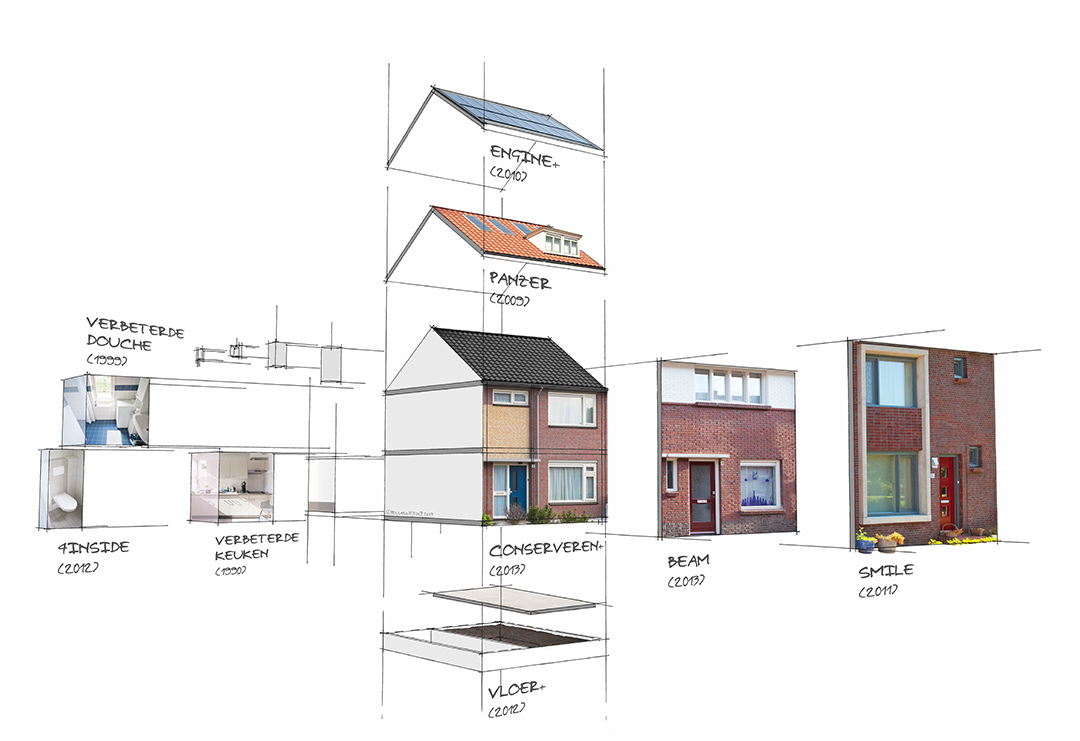The majority of bathrooms and kitchens end up with the rubbish after new owners move into a house. Unnecessary: a demountable solution would make replacement easy. Doctoral candidate Henk Brinksma researched various future-proof renovation concepts, and looked further than just bathrooms and kitchens.
Ill-considered renovations often result in unnecessary damage. Gluing a glazing bar in place may seem like a good idea, as there is no need to make any holes, as when using nails and screws. But the contractor who had that idea regretted his actions when, a couple of years later, the double glazing had to be replaced by triple glazing. "He had to hack them all out again," says Brinksma, himself the son of a contractor. "In the light of the energy-based renovations currently underway in the Netherlands, it is an apt example. Is what we are doing at the moment really such a good idea?".
There are 7.5 million houses in the Netherlands, 80% of which were built after the war. According to the experts, these houses will on average last longer than 120 years, and will undergo multiple renovations. Large numbers of houses are currently having their energy efficiency improved, or are being fitted with a ‘second skin’. Fine for reducing energy usage, but a load-bearing facade element such as is now being added removes the possibility for extension at a later date. Serial renovations do not always take individual residents into consideration.

Images by BouwhulpGroep
Brinksma therefore started to wonder whether there are smarter ways of building and renovating. The answer: yes, there are. Various earlier construction concepts point the way. Back in the early 1960s, Professor John Habraken concluded that, in the ideal house, the support structure and built-in components would be separate. This would make it possible to change the interior of the building without altering the load-bearing structure. His Foundation for Architects' Research (Stichting Architecten Research, SAR) was followed by the Open Building Foundation (Stichting Open Bouwen, SOB), Industrial, Flexible and Demountable (IFD) Building, Smart Building (Bouwen, Slimbouwen), Conceptual Building and ‘LEGOlisation’. The common denominator is the focus on demountable concepts, where adjustments and renovations at a later time are simple.
Using literature-based research, Brinksma formulated his definition of future-proof renovation as: "Renovation in such a way that the solutions offered do not stand in the way of future renovation work, and preferably facilitate the possibility of such work". Using his literature-based research, he drew up a list of 13 questions. These questions address concerns, including whether joints are flexible, whether series of one are possible, and whether residents can influence the selected method. The questions also examine whether the technical lifespan of the elements is aligned and whether the renovations can respond to climatic changes.
Based on his questions, Brinksma concludes that there are certainly rays of hope in today’s building practice. A prefab bathroom that can be fitted in one day (Mitros) offers a solution that simplifies future adjustments. The same applies to the flexible facade and roof renovation concept introduced by VolkerWessels' BJW Duurzaam and Plus Renoveren, in which the installation technology is also future-proof.
Nevertheless, the vast majority of the estimated 1,600 companies in the renovation sector still sets to work in the ‘old fashioned’ way: by gluing and laying bricks. That is outmoded in an age of circular production and construction. It would be ideal if, at the end of its life cycle, a newly added element could be returned to the manufacturer in its entirety. Perhaps new regulations could help promote change? Brinksma: "I think so. German regulations regard a kitchen as moveable property, which you can lease. That encourages manufacturers to offer decent products. Future renovation certainly has the potential to deal with demands we can't yet foresee".
Published: November 2017
More information
- PhD thesis 'Toekomstbestendig renoveren' (Dutch only)
